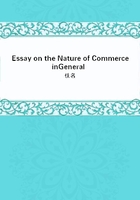
第48章
On Foreign Trade When a state exchanges a small product of land for a larger in foreign trade, it seems to have the advantage; and if current money is more abundant there than abroad it will always exchange a smaller product of land for a greater.
When the state exchanges its labour for the produce of foreign land it seems to have the advantage, since its inhabitants are fed at the foreigner's expense.
When a state exchanges its produce conjointly with its labour, for a larger produce of the foreigner conjointly with equal or greater labour, it seems again to have the advantage.
If the ladies of quality of Paris consume yearly Brussels lace to the value of 100,000 ounces of silver, a quarter of an acre of land in Brabant, which will grow 150 pounds weight of flax, to be made into fine lace in Brussels, will answer this value. This will require the yearly labour of about 2000 people in Brabant for the several parts of the work from the sowing of the flax to the final perfection of the lace. The lace merchant or undertaker at Brussels will advance the capital. He will directly or indirectly pay all the spinners and lace-women and the proportion of the labour of those who make their tools. All those who have taken part in the work will buy, directly or indirectly, their maintenance from the farmer in Brabant who pays in part the rent of his landlord. If in this economy the produce of the land attributed to these 2000 persons be put at 3 arpents per head as well for the maintenance of themselves as for that of their families who subsist in part upon it, there will be 6000 arpents of land in Brabant employed for the support of those who have worked on the lace, at the expense of the ladies of Paris who will pay for and wear the lace.
The ladies of Paris will pay the 100,000 ounces of silver, each according to the amount she has bought. All this silver must be sent to Brussels in specie, less only the cost of remittance, and the entrepreneur at Brussels must find in it not only payment of all his advances and the interest of the money which he has perhaps borrowed, but also a profit on his undertaking for the maintenance of his family. If the price which the ladies pay for the lace does not cover all the costs and profits there will be no encouragement for this manufacture, and the entrepreneurs will cease to carry it on or become bankrupt; but as we have supposed this manufacture is continued, it is necessary that all costs be covered by the prices paid by the ladies of Paris, and the 100,000 ounces of silver sent to Brussels if the people of Brabant take no commodity from France to compensate this debt.
The ladies of Paris will pay 100,000 ounces to him who sells and delivers to them the lace; he will pay them to the banker who will give him one or more bills of exchange on his Brussels corespondent. The banker will remit the money to the wine merchants in Champagne who have 100,000 ounces of silver at Brussels and who will give him their bills of exchange of the same value drawn upon him by his Brussels correspondent. Thus the 100,000 ounces paid for the Champagne wine at Brussels will balance the 100,000 ounces paid for the lace at Paris, and in this way the trouble of sending to Brussels the money received at Brussels will be avoided. This balance is effected by bills of exchange, the nature of which I will try to explain in the next chapter.
Meanwhile this example shows that the 100,000 ounces which the ladies of Paris pay for the lace, come into the hands of the merchants who send Champagne wine to Brussels; and that the 100,000 ounces which the consumers of the Champagne pay for this wine at Brussels fall into the hands of the entrepreneurs or lace merchants. The entrepreneurs on each side distribute this money to those whose labour they employ, either on the wines or on the lace.
It is clear from this that the ladies of Paris support and maintain all those who work on the lace in Brabant and cause money to circulate there, and equally that the consumers of Champagne wine at Brussels support and maintain in Champagne not only the vineyard keepers and others who take part in the production of the wine, the cartwrights, farriers, carters, etc. who take part in the transport, and the horses engaged in it, but that they also pay the value of the produce of the land for the wine, and cause a circulation of money in Champagne.
Nevertheless this circulation or trade in Champagne, which makes so great a stir, which maintains the keeper of the vineyard, the farmer, the cartwright, the farrier, the carter, etc. and which pays precisely as well the rent of the owner of the vineyard as that of the owner of the pastures which serve to feed the carthorses, is in the present case a burdensome and unprofitable trade to France when considered by the effects that it produces.